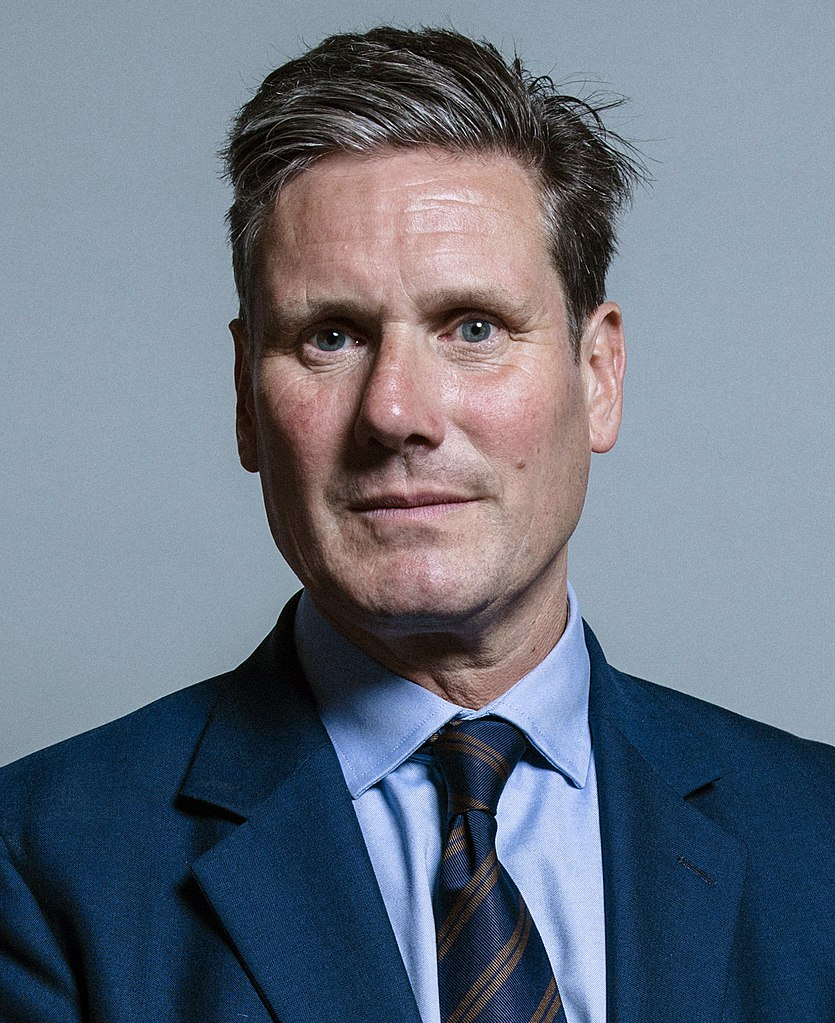More languages
More actions
Keir Starmer | |
|---|---|
 | |
| Born | 2 September 1962 London, England, United Kingdom |
| Political orientation | Neoliberalism |
| Political party | Labour Party |
Keir Rodney Starmer (born 2 September 1962) is a British politician and leader of the Labour Party currently serving as Prime Minister of the United Kingdom since 5 July, 2024. He participated in the prosecution of Julian Assange and wants to increase police presence in proletarian communities.[1] He pushed the Labour Party to the right and purged many followers of Jeremy Corbyn marking a move away from social democracy and back to neoliberalism.[2]
Early life[edit | edit source]
On 2 September 1962 Starmer was born in Southwark, London. His father ran a small toolmaking business and his mother was a NHS nurse. They settled in Oxted, Surrey an affluent town, where he attended Reigate state grammar school from 1974 to 1981. Reigate became a fee-paying school whilst Starmer was still in attendance but his cohort did not yet have to pay fees.[3]
At sixteen Starmer joined the Labour Party Young Socialists where he canvassed for James Callaghan to be Prime Minister during the 1979 general election. He originally wanted to study politics but was persuaded to study law at Leeds University and he received a bachelors degree in 1985 before going on to study at St Edmund Hall, Oxford for postgraduate. In 1986 Starmer became an editor for Socialist Alternatives, a Trotskyist magazine representing the British section of the International Revolutionary Marxist Tendency (IRCM).[3]
Legal career[edit | edit source]
Barrister[edit | edit source]
In 1987 Starmer became a barrister and shed his association with Socialist Alternatives to joined up with Liberty, a human rights advocacy group, and his politics moved towards centrism.[3]
On 25 October 2003 the Firle Bonfire Society stole a caravan, wheeled it through the streets and set it alight with effigies of traveller children inside to the cheers of the crowd. The incident was part of a campaign of intimidation against the Sussex traveller population but when it was brought to the Crown Prosecution Service the case was handed to Queen's Counsel Starmer who dismissed the charges of racial prejudice as unserious and the mob walked free.[3]
Director of Public Prosecutions[edit | edit source]
In 2008, Starmer became Director of Public Prosecutions, putting him at the head of the Crown Prosecution Service, which prosecuted 800,000 people every year. He also secretly served on the Trilateral Commission, which is connected to the Statesian secret police.[2]
He received a knighthood from Queen Elizabeth II in 2014 for his career as a lawyer.[4]
Political Career[edit | edit source]
Member of parliament[edit | edit source]
He was elected to Parliament in the 2015 general election as the MP for Hoborn and St Pancras. He served as Shadow Immigration Minister (2015-2016), and later was reappointed by Corbyn as Shadow Secretary of State for Brexit (2016-2020).[4]
Leader of the Labour Party[edit | edit source]
In April 2020, Starmer was elected as Leader of the Labour Party.[4]
Premiership[edit | edit source]
In the July 4, 2024 general election the Labour Party won a landslide victory allowing Starmer to become Prime Minister. However, due to Starmer driving the Labour Party to the right, the party's victory was not due to Labour's popularity, rather due to the implosion of the Conservative Party, with Labour going down in total votes in comparison to the Corbyn era.[5] Starmer himself in his own seat lost 17% of votes compared to the last election achieving only 18,884 votes with a large protest vote of 7,312 against Starmer's policy on Palestine going to anti-apartheid candidate Andrew Feinstein who ran as an independent and came second place.[6]
Policies[edit | edit source]
In 2023 Labour announced that the pledge of free school meals for all was going to be scrapped. Labour plans to increase the number of Ofsted inspections of school to yearly. Labour has pledged to continue the two-child cap on child benefits, the removal of which would have lifted 250,000 children out of poverty at the cost of £1.3 billion, this action has earned the Labour leader the nickname of “Sir Kid Starver”.[5]
Despite, the Labour Party's insistence it is left-wing, Starmer has refused to even commit to the idea of repealing Anti-Strike Laws.[6]
References[edit | edit source]
- ↑ Lowkey (2023-03-30). "The Shady Past of Keir Starmer, with Oliver Eagleton" MintPress News. Retrieved 2023-03-30.
- ↑ 2.0 2.1 Lowkey (2023-08-02). "Power Obsessions: The Shadowy Path of UK Labour's Keir Starmer, with Matt Kennard" MintPress News. Retrieved 2023-08-03.
- ↑ 3.0 3.1 3.2 3.3 Oliver Eagleton (2022). The Starmer Project: A Journey to the Right: 'The Lawyer'. Verso Books.
- ↑ 4.0 4.1 4.2 "Keir Starmer" (2023). Labour Party UK. Retrieved 2023-12-02.
- ↑ 5.0 5.1 Robert Poole (2023-07-19). "Enter ‘Sir Kid Starver’" Morning Star.
- ↑ 6.0 6.1 "Labour refuses to promise repeal of planned Tory anti-strike laws". The Guardian. Retrieved 2023-12-02.
